We hear from many people, health is everything and even there is also a famous quote “health is wealth” which shows the importance of health in our life. Some people say, to perform daily tasks, you need to be healthy. Now, Question comes into the mind how can we become healthy. There are many factors that become you a healthy. Balance Diet is one of them. The second question after hearing this arise what is a balanced diet and how to can we get this??? Don’t worry we are here to explain everything about a balanced diet.
What is a Balanced diet??
If we break down a balanced diet then we come to know two things Balanced and diet. Diet is what we consume in a single day and get energy. If we add the word balanced to the diet then it becomes the diet which gives you all those nutrients that your body needs to function properly.
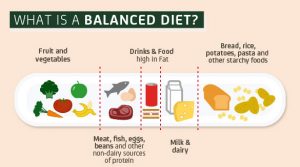
We can’t get all the essential nutrients from a single diet except breast milk and also the proportion of different nutrients varies from food to food. Therefore, it is necessary to add a different variety of foods in your diet to get benefit from all the nutrients to keep your body healthy and in other words, you need a balanced diet.
Components of a balanced diet
Diet is the most important requirement for human life. According to science, a balanced diet is something which gives energy to the body after digestion and provides perfect support for the development of your body. Here are some basic components of a balanced diet.
Water
Water is very important for life. We can be survived for months without food but in the absence of water, we cannot survive. It is the largest component of the human body. An Adult body contains water more than 60 percent of its weight. More than 60 percent of its weight in an adult body contains water.
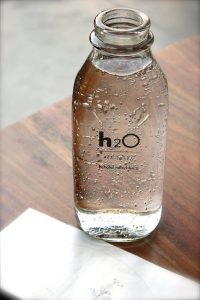
Water performs many functions in our body. It helps in maintaining body temperature. It breaks nutrients, enzymes, and other chemical substances and resolves it in a body. Because of it, various chemical reactions take place between the cells. It acts as conveyer to deliver nutrients to the cells and to remove waste substances from the body. It acts as a lubricant between joints and human organs.
Carbohydrates
These are the component of carbon, hydrogen, and oxygen. These are often present in all living creatures and are found in almost all the cells. Cellulose present in wooden, cotton and paper; starch in cereals and root tubers; glycogen in the animal liver; lactose present in milk and sucrose in sugar cane are some examples of carbohydrates.
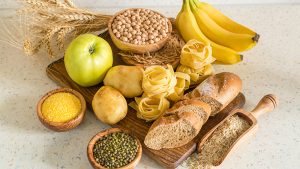
These play an important role in the structure and functions of living cells. These are the largest source of energy. Mostly we get carbohydrates from plant sources. Wheat, rice, sugarcane, potatoes, and sweet potatoes are some example of plantation source.
Fats and Oils
At normal temperature, fats are solid and oils are liquid. Usually, we get fats from the animal source while oils we get from plant sources.

Mostly, there is a misconception about fats. People think fats are harmful to the body and they consider fats, a reason for weight gain. In Actual, there are two types of fats.
- Saturated Fats
- Unsaturated fats.
Saturated fats can be found in cheese, butter, and other dairy products. These types of fats are bad for health. These can raise your cholesterol level and increase the chances of obesity, heart attack, heart stroke, and other dangerous diseases.
On the contrary, unsaturated fats are good for human health and provide energy to our body. These fats contain more energy compared to proteins and Carbohydrates.
Unsaturated fats provide fat-soluble vitamins and fatty acids. These fats accumulate under the skin and help in maintaining the body temperature.
Minerals
Minerals are essentials component of diet which keep your body healthy and increase the efficiency of the body to perform different tasks. There are two types of minerals.
- Macro or Major Minerals
- Micro or Trace Minerals
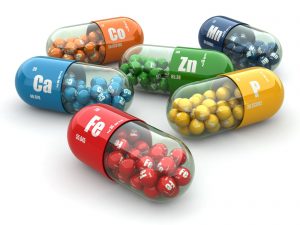
Minerals that are required in a smaller amount in our body are called Micro or Trace Minerals. It includes iron, Manganese, Copper, Iodine, Zinc, Cobalt, Fluoride, and Selenium.
Minerals that are required in a larger amount in our body are called Major Minerals or Macro Minerals. It includes Calcium, Phosphorous, Potassium, Magnesium, Sulfur, Sodium and Chloride.
If minerals are not the part of our daily diet then the human body can develop in a normal and healthy way. Minerals help in digestion and increase metabolism. These are necessary for the growth of teeth and hair. For the healing process, we need minerals. Minerals also utilize nutrients from the food.
It is necessary to maintain the balance in consuming minerals because deficiency of minerals can involve you in dangerous diseases such as Brittle (a medical condition which makes your bones weeks) and overdosing of minerals can also lead you toward medical conditions such as the excess of potassium in our body results in improper functioning of kidney.
Vitamins
Vitamins are such organic compound which our body needs to work properly and efficiently. If vitamins are not a part of our diet then our bodies parts cannot be grown in a proper way. Vitamins are categorized into two types
- Fat Soluble Vitamins (Vitamin A, Vitamin D, Vitamin E and Vitamin K )
- Water Soluble Vitamins (Vitamin B and Vitamin C)
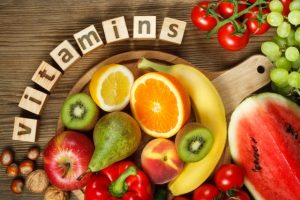
Insufficient consuming of these vitamins can cause dangerous diseases. For Instance, Vitamin A is good for improving vision and deficiency of it can cause night blindness. vitamin D is good for healthy and strong bones and deficiency of it can cause Rickets (A medical condition in which bones of children become weak).
Proteins
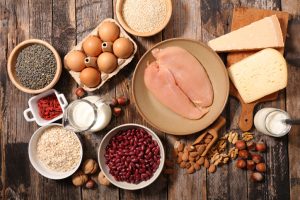
After water, Proteins can be found in larger quantity in our body. Muscle, tissues, and blood contain mostly proteins. Due to proteins, many functions in our body happen. Proteins are the building block of muscle, skin, and tissues. Enzymes and hormones are also proteins which control chemical interaction and different functions in our body. Some Proteins, which we also call antibodies, provide immunity to the body against the diseases. According to DRI (Dietary Reference Intake), 56 grams per day for men and 46 grams per day for women are necessary.
Why balanced diet is so important?
Balance diet is necessary for proper functioning of tissues and organs. It is necessary because it gives your body energy to perform routine tasks. Without it our body suffers from dangerous diseases and infections which ultimately decreases our performances and our life span.
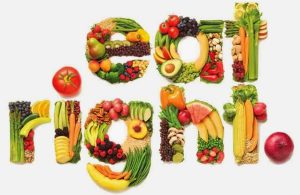
Here are some benefits of a balanced diet which shows its importance for healthy lives.
- A balanced diet includes all those minerals and vitamins which improve our immune system and prevent the body from viruses, infections, and diseases.
- It is very challenging to always remain on weight loss diet through life. A balanced diet is the only way which helps in maintaining the weight that people have achieved by hardworking and by controlling their appetite.
- It improves mental health and is also important for the growth of your children. Poor diet not only makes children weak but also affect their personality development and growth.
- A balanced diet provides all those vitamins which are important growth of hair and gives healthy, glowing and wrinkles skin.
A report shows that insufficient diet causes death by involving the body in diseases like heart attack, cancer, diabetes, and stroke.
How can we achieve a Balanced Diet?
There are some foods which contain vitamins and minerals that are essential for the body and are low in fat and sugar.
Fruits
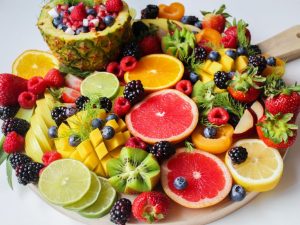
Fruits are a great and natural source of achieving a balanced diet. Some fruits contain high sugar but it is unharmful if we compare it with Added sugar foods. People suffering from diabetes should choose fruits which are low in sugar like strawberries, kiwis and grapefruits etc. Fruits provide your body with all healthy minerals and vitamins.
Vegetables
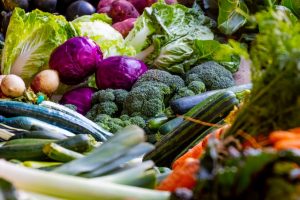
Vegetables are an important source of getting healthy vitamins and minerals. Vegetable includes fiber potassium, vitamin A, E and C which helps our body to resist diseases like diabetes, cancer and stroke and heart attack. Vegetables, especially dark leafy vegetables which include more nutrients and minerals, as part of a balanced diet minimize the risk of obesity; keep your cholesterol level and blood pressure in control. In addition, it also maintains our body weight.
Starchy Foods
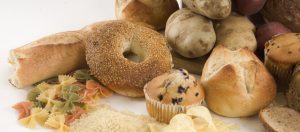
Another source of balanced diet is starchy foods (pasta, bread, oats, and cereals) which include important minerals, nutrients, fiber and provide energy to your body. There is a misconception about starchy foods that they increase body weight but they don’t. Increasing of body weight depends on how you cook and serve starchy foods to eat.
Dairy Products
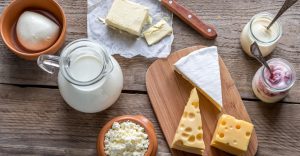
Most dieters or weight conscious people stop eating dairy products as it contains a high amount of saturated fat but it is one side of a coin. On other hands, the dairy products contain calcium, minerals and healthy vitamins which not only make your bones strong but also essential for growth and development of a body. Those people who don’t eat dairy products just because their weight will increase, for them in supermarkets, low-fat dairy products (low-fat yogurt and skim) are available which they can use as a plan of a balanced and healthy diet.
Proteins
Proteins are the most essential and important source of balanced diets as it performs different roles in our body. Repairing and maintenance of damaged cells and tissues, helping human organs to communicate with each other, improving the immune system, maintaining fluid balance and providing energy to the body are some important functions that protein performs.
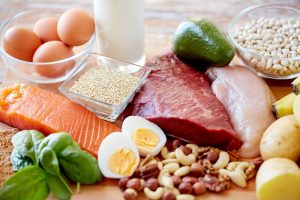
Some sources of proteins are
| Protein Source | Grams | Protein per Serving |
|---|---|---|
| Cheese | 1 oz slice | 7 grams |
| Dried beans and peas, legumes | ½ cup | 7 grams |
| Eggs | 1 | 7 grams |
| Meat, fish, poultry | 4 oz portion | 28 grams |
| Milk | 8 oz glass | 8 grams |
| Peanut butter | 2 Tbsp | 2 Tbsp |
| Soy crumbles | ½ cup | 11 grams |
Actually, the amount of proteins depends on how many calories your body consumes. The percentage of calories that should be obtained from proteins varies from 10 to 35 percent. 1 gram of protein is equal to 4 calories. It means if a person is consuming 3000 calories than he would consume 75 to 262.5g of protein. RDA (Recommendation Dietary Allowance) has recommended 0.8 gm per kg weight per day.

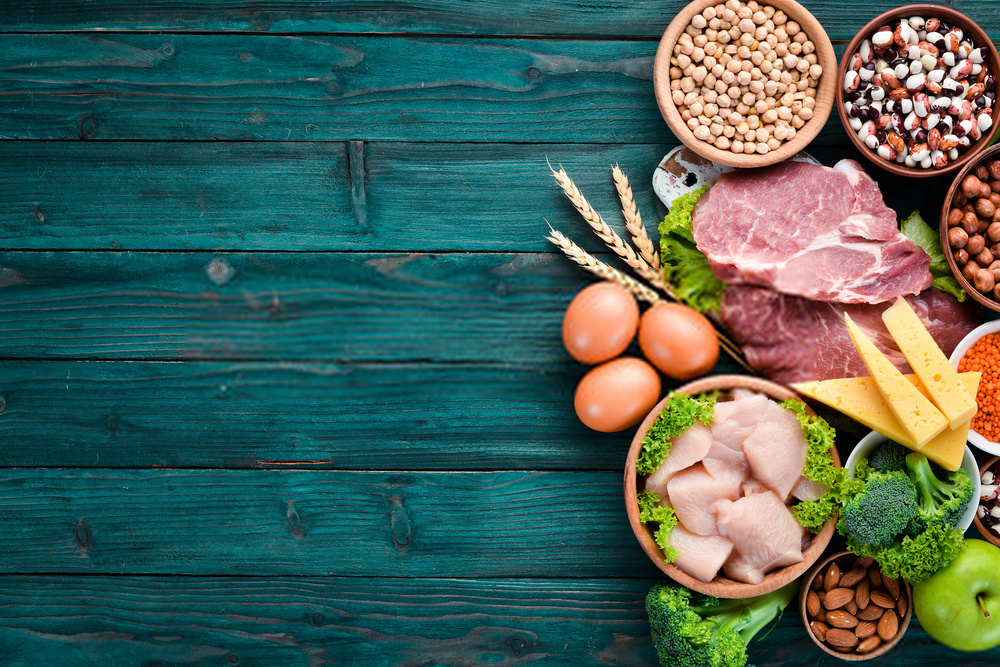

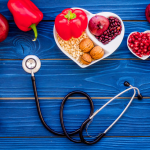
1 Comment
These are very good tips especially to those new to blogosphere, brief and accurate information… Thanks for sharing this one. A must-read article.